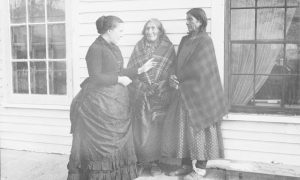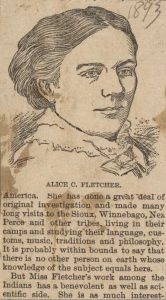
Alice Fletcher, Meepe, and Martha, ca. 1887-1889, BAE GN 4439, National Anthropological Archives, Smithsonian Institution. https://transcription.si.edu/articles/alice-cunningham-fletcher-and-francis-la-flesche-transcription-center
As a class, we recently learned about Frances Densmore’s ethnographic research on Native Americans, in which she recorded and documented myriad songs and information about the culture of multiple Native American tribes in Minnesota and the US. Densmore approached her research on these groups as a scientific endeavor—viewing Native Americans through a nineteenth-century racialized lens that perceived them as tantamount to the natural landscape and representative of a primitive European past. However, she was not the first, nor the only ethnologist learning about and extracting the sonic resources of Great Plains tribes at that time. Consider Alice C. Fletcher, who “began collecting ethnological and musical data in 1883 among the Omaha and Dakota Indians.”[1]As both Densmore and Fletcher’s work perpetuated cultural imperialism, understanding how it contributed to the development of ethnomusicology at the expense of native cultures perhaps leads to a better understanding of the discipline’s tainted, yet prolific, roots.[2]
An 1893 news clipping from the scrapbook of Ely Samuel Parker describes Alice C. Fletcher as “A Woman Who Worthily Stands for Her Sex,” referring to her work as President of the Anthropological Society.[3] Having studied “Indians in our Western Territories,” the writer declares that “there is no one in this or any other country whose knowledge on the subject approaches hers.”[4] For her research, Fletcher “…spent years among the Indians, living in their camps unprotected, learning their language, studying their customs, music…”[5] The writer states that at the time of this publication, she was in the midst of “revising…an important work on the music of the Omaha Indians…”[6] Two decades later into her career, she published a 600+ page work on the history of the Omaha Tribe that I tracked down in the library.[7] Like Frances Densmore in numerous works like Chippewa Customs, she notates indigenous songs using western notation (reinforcing its colonial hierarchy), and uses a social scientific lens to try and explain their culture. Yet in the 1893 clipping, the writer assures us that her “work among the Indians has a benevolent as well as scientific side”[8]

Ely Samuel Parker scrapbooks: Vol 11, 1828-1894, The Newberry Library, 34.
The article goes on to describe her friendship developed with the tribe, and how she leverages this to “secure for the Peabody museum trophies and relics from the different tribes which had never ever been seen by a white man.”[9] Ultimately, this transactional relationship unfortunately outlines how researchers of her era thought it ok to exploit the trust of tribes. Native Americans fit a Western narrative believing that “these supposedly primitive musical cultures were part of a dying world that was succumbing to American civilization and that scholars needed to preserve what they could before their assumed extinction.”[10] Fletcher’s work was profound—she published the first ethnographic presentation of a Native American tribe’s music in 1893 (the aforementioned work on the Omaha) and she wrote more than 97 entries for the Bureau of American Ethnology’s Handbook of American Indians North of Mexico in 3 years—however, it was grounded by racist assumptions all too common at the turn of the century.[11] It’s important to conceptualize how Fletcher’s work as among the first to record Native American music provided detailed documentation of their history while perpetuating biased beliefs of a racialized musical hierarchy that others, like Densmore, would build upon.
[1] Sue Carol DeVale, “Fletcher, Alice Cunningham,” Grove Music Online, 2001. https://www.oxfordmusiconline.com/grovemusic/view/10.1093/gmo/9781561592630.001.0001/omo-9781561592630-e-0000009816.
[2] Krystyn R Moon, “The Quest for Music’s Origin at the St. Louis World’s Fair: Frances Densmore and the Racialization of Music,” American Music 28, no. 2 (2010): 191-210. muse.jhu.edu/article/379952.
[3] Ely Samuel Parker scrapbooks: Vol 11, 1828-1894, The Newberry Library, 34. https://www.aihc.amdigital.co.uk/Documents/Images/Ayer_Modern_MS_Parker_VL11/24#VisualMaterials
[4] Ibid.
[5] Ibid.
[6] Ibid.
[7] Alice C Fletcher (Alice Cunningham), and Francis La Flesche, The Omaha Tribe, Washington: [publisher not identified], 1911.
[8] Ely Samuel Parker scrapbooks, 34. https://www.aihc.amdigital.co.uk/Documents/Images/Ayer_Modern_MS_Parker_VL11/24#VisualMaterials
[9] Ibid.
[10] Moon, “”The Quest for Music’s Origin at the St. Louis World’s Fair,” 191-210. muse.jhu.edu/article/379952.
[11] Alice C. Fletcher, et al., Life among the Indians: First Fieldwork among the Sioux and Omahas (Lincoln, Nebraska, 2013): 61, 71. http://ebookcentral.proquest.com/lib/stolaf-ebooks/detail.action?docID=1495860.
